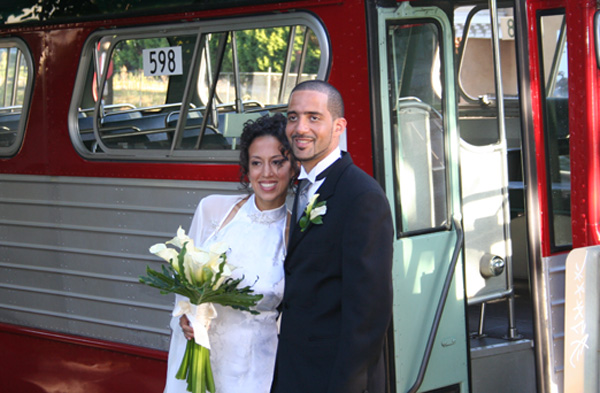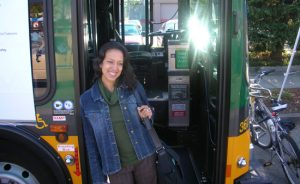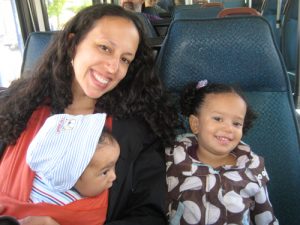
Carla Saulter the Bus Chick, her husband and children have relied solely on public bus transit for eight years
By Glenn Swain

When fiction writer and mother Carla Saulter of Seattle, WA takes her 3-year-old daughter Rosa and 1-year-old son Quincy across town, she doesn’t strap them in the back of a minivan. Instead, they board a city bus.
Carla and her husband, Adam, do not own vehicles. The family has been car-free for nearly eight years.
Five years ago their unconventional choice to get around without a vehicle led to Carla writing a transit blog for Seattlepi.com. Under her pseudonym “Bus Chick,” her blog has steadily grown in popularity, at times receiving as many as 30,000 hits in a month.
While a great number of readers find Carla the Bus Chick entertaining and engaging, just as many find it hard to believe an individual — let alone an entire family — can live day to day without a vehicle.
“Most of our friends think we’re crazy,” Carla says. “Since starting the blog, I’ve met a lot of people who have become more involved in transit activism. I do find them more inspired to try, but no one has gotten rid of their car. I had no idea that I would even have readers following me, and that it would go on for five years.”
With her family being a major part of her blogs, Saulter the Bus Chick nicknamed her daughter Rosa “Chicklet.” She now refers to Quincy as “Busling.” And husband Adam? He is the self-described “Bus Nerd.”
Aside from all the positive reasons to utilize the transit system, Carla finds riding the bus a very fertile place for finding ideas for her writing.
“What’s interesting is the slice of life I get out of it,” she says. “There are all of these different people from all walks of life, and they are all thrown together for this short amount of time. It’s very interesting. I have always wanted to write about people I’ve met or seen on the bus.”

Carla admits to being a chronic eavesdropper.
“I don’t have any conversations on the bus that I consider to be personal because we are sharing a public space,” she says. “I never identify people, it is just a random process. I would never choose to invade someone’s privacy.”
Transit romance
About 10 years ago truth became stranger than Carla’s fiction when she began noticing a particular man on the 545 Richmond bus. For some reason Carla wanted to know this fellow who turned out to be Adam. They introduced themselves following an event, and soon after the two began sitting together on the bus. One day while riding the 545 Adam mentioned that he and a friend had nicknames for people they both talk with on their cell phones. When Carla asked what her nickname was, Adam immediately answered, “You’re the Bus Chick.” That conversation led to talking about cars, or Adam’s lack of one by choice.
“I said something that prompted him to tell me he didn’t even own a car,” Saulter says. “He says I am the only woman he’s ever met who thought that was cool, and he’s the first person I’ve ever met who did not have a car on purpose. He inspired me to try it.”
Ironically, Adam’s hometown is Detroit, home of the American auto industry. He has never owned a car in his professional life.
The couple married in 2006. For their wedding they rented an old bus restored by a Seattle transit employee association. They would have it no other way.
Reasons for transit
While riding Seattle’s transit system is fodder for the blogs and newspaper columns, Carla and her family also save money — lots of it. The American Automobile Association releases figures on the cost of vehicle ownership, factoring in cost of gas, depreciation and insurance tax. For 15,000 miles of driving, the average cost per year for insurance, taxes, licenses, depreciation and other cost runs nearly $8,000. Factor in the cost of gas per mile at about 15 cents and the number goes higher. Drive a 4-wheel drive SUV and the yearly cost can be over $11,000.
“For our non-two car family we’re saving well over $10,000 dollars,” Carla says. “You save that money, along with the compounded interest. That’s years off of our working lives.”
Carla calculates that she spends less than $700 a year on a transit pass, while her husband’s rides are free through his company. She says they may spend another $500 or so on zip car rentals and cabs.
“Actually looking at my time holistically, I am also saving a ton of time,” she says. “I don’t have to work to support a car habit.”
Years ago Carla had a job that forced her to commute by car over four freeways. She found herself griping about the traffic and the time being wasted getting to and from work.
Carla makes it clear that she is not anti-car, but more conscious of the carbon footprint each person leaves.
“I don’t think cars are evil and no one should ride in them,” she says. “I think cars are useful for certain purposes. The problem comes when we decide to use cars for every travel need that we have. Think differently about how we can get around. I think a lot of people assume they could not do without a car. Also, the way people live and have been encouraged to live has made it difficult to live without a vehicle.”
Carla adds that going car-free is not for every one, but those considering it should choose wisely where they want to live and how close they need to be to amenities such as grocery stores and parks.

Quality time
While saving money, being kind to the environment and sitting in traffic are good reasons for using transit, Saulter finds the experience allows for more quality time with her children and husband, and gives them a chance to meet their neighbors.
“I love how we spend our travel time,” she says. “I can use my time efficiently. I can read, nap or work. I can do anything I want riding the bus. I don’t own a gym membership because I walk all the time.”
Saulter says her daughter started talking at eight months.
“I think a lot of it is because I have a lot of time to talk to her and show her things,” she says. “My kids are not strapped in the back of a car where I can’t see them, or if one’s crying and I have to reach around to hand them a snack. Riding the bus is real quality time.” BR
